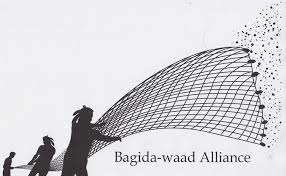Project
Last Updated on September 28, 2023

Project
Planetary Health Partnership: Anishinaabe youth guardians, land-based learning, and the practice of living well with the world will promote youth-led education, research and action that highlights and supports Indigenous knowledge and planetary health. In addition to its academic and policy related goals, the project will provide important training in research methods and digital media production for Indigenous youth, and facilitate land-based and experiential education opportunities and knowledge exchange between Indigenous Elders and youth.
In doing this the project will be divided into three thematic areas of focus: 1) Decolonizing water; 2) Decolonizing land; 3) Decolonizing conservation.
Specific project activities will include land-based learning and experiential education event(s) with youth guardians, including a ceremonial Water Walks and shoreline clean-ups around the Bruce Peninsula (Year 1), land-based learning and Indigenous knowledge sharing along the Bruce Trail through the traditional territory of the Saugeen Ojibway Nation (Year 2), and a decolonizing conservation event involving stewardship, recreation and educational activities in and around Bruce Peninsula National Park and Fathom Five Marine Reserve on the Bruce Peninsula (Year 3).
Background
Efforts to safeguard and promote human and environmental wellbeing have never been more urgent. In the context of accelerating environmental degradation, species extinction, climate change, and the related threats these pose to human health and wellbeing, it is increasingly apparent that Indigenous ways of being in the world, which emphasize interdependence and reciprocal stewardship, can offer solutions for securing planetary health and sustainability. The overarching goal of this project is to operationalize a decolonized approach to Planetary Health research that draws on and promotes Anishinaabe practices of mino biimadisiwin (living well with the world) with Indigenous youth.
Objective
The primary objectives of the project include:
1) Provide training for Anishinaabe Youth Guardians in the principles and practices of environmental stewardship, governance, and advocacy;
2) Foster social and ecological wellbeing with Anishinaabe youth through land and water based learning activities, including traditional harvesting, stewardship, recreational, and ceremonial activities;
3) Encourage and facilitate inter-generational dialogue and knowledge exchange between Indigenous Elders, Knowledge Holders and youth;
4) Training for Anishinaabe Youth Guardians in research creation and knowledge mobilization, including interviewing techniques, and digital media and documentary film production;
5) Mobilize knowledge co-created through the project for policy-makers, academics, Indigenous Peoples and the general public through multiple formats and platforms, including youth-created digital and social media content, regional public presentations and workshops, academic conferences and publications, and the production of a documentary film.
Project Team
Project Lead
Dr. James Stinson is a cultural anthropologist who specializes in political ecology and human-environment relations. His research has focused on the management of national parks and protected areas in Canada and Latin America, and the participation of Indigenous Peoples nature conservation. His current research involves working with youth from the Saugeen Ojibway Nation to document Indigenous conceptions of, and responses to, climate change on Lake Huron and Georgian Bay.
Team Members
James Stinson - Principle Investigator
Natasha Akiwenzie - Co-Investigator
Victoria Serda - Co-Investigator
Kate Tilleczek - Co-Investigator
James Orbinski - Co-Investigator
Robin Roth - Co-Investigator
Biidaabinokwe Jessica Keeshig-Martin, Collaborator
Mark Terry - Collaborator
Waasekom - Project Coordinator
Ningwakwe George - Elder Advisor
Funding
This project has been funded through a Partnership Development Grant from the Social Sciences and Humanities Research Council.

Themes | Planetary Health |
Status | Active |
Related Work |
N/A
|
Updates |
N/A
|
People |
James Stinson, Postdoctoral Fellow, Planetary Health & Education - Active
Rebecca Babcock, Research Assistant, Global Health and Humanitarianism - Alum |
You may also be interested in...
'Dynamic and Transformative' Experience at ISA 2024 in San Francisco
For Nilanjana (Nell) Ganguli, attending the ISA 2024 Conference in San Francisco was more than just an academic exercise—it was a dynamic and transformative experience. As a first-timer at this renowned gathering, Nell was immersed ...Read more about this Post
Don't Miss Our November Lineup of Events
Join us for a November packed with insightful seminars, inspiring guests, and the launch of SWOT v2. Start off the month with a public seminar by visionary designer and Dahdaleh Institute community fellow Bruce Mau. ...Read more about this Post
Publication – Integrating Blue: How Do We Make Nationally Determined Contributions Work for Both Blue Carbon and Local Coastal Communities?
Dahdaleh Institute Planetary Health Fellow Byomkesh Talukder was one of 33 experts in academia, project development, and policy who each developed ten key questions about how to implement Nationally Determined Contributions (NDCs) to optimize Blue ...Read more about this Post
